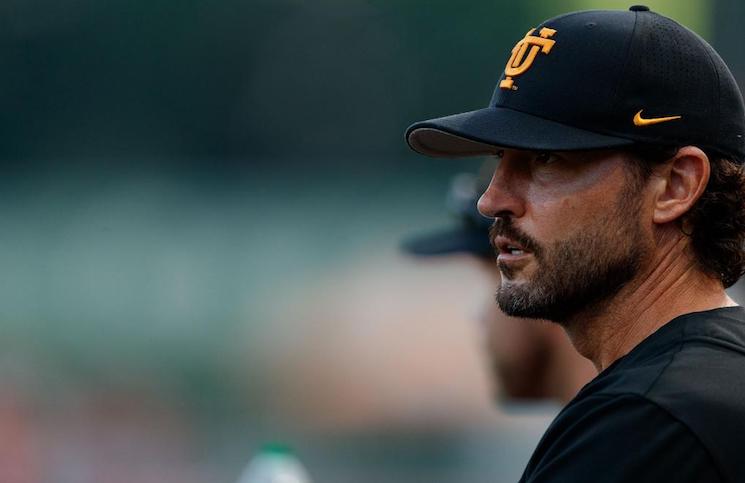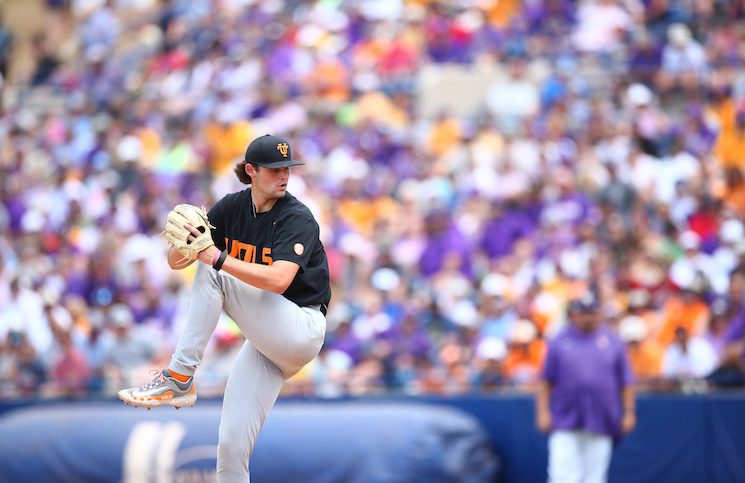
Tennessee basketball begins its preseason practice today with the season opener against UT-Martin six weeks away.
The Vols are coming off an 18-9 season that saw Tennessee finish fourth in the SEC and earn a five-seed in the NCAA Tournament before losing in the first round to Oregon State.
Tennessee experienced major turnover entering this season, losing three players to the NBA, four to the transfer portal and two assistant coaches to head coaching jobs. Rick Barnes restocked his roster, bringing in the nation’s No. 4 signing class and an impact transfer from Auburn. The Vols are viewed as a top 25 team in a loaded SEC.
Here are five questions facing Tennessee basketball at the start of preseason practice.
How Quickly Do The New Look Vols Mesh?
Tennessee basketball is going through a roster flip that it hasn’t seen since Cuonzo Martin left for Cal and Donnie Tyndall became the Vols’ head coach.
Keon Johnson, Jaden Springer and Yves Pons are now in the NBA and Drew Pember, Davonte Gaines, E.J. Anosike and Corey Walker all transferred to schools with lesser basketball esteem.
In comes the nation’s fourth-best recruiting class, including five-stars Kennedy Chandler and Brandon Huntley-Hatfield, four-stars Jonas Aidoo and Jahmai Mashack, and three-stars Quentin Diboundje, Zakai Zeigler and Handje Tamba.
Barnes and his staff also brought in Auburn transfer Justin Powell. Powell averaged 11.7 points, 6.1 rebounds and 4.7 assists in 10 games as a freshman last season.
Tennessee was able to bring back John Fulkerson for a super-senior season due to NCAA COVID-19 eligibility relief. The return of Fulkerson should help stabilize Tennessee’s roster by providing a veteran leader.
How the Vols’ newcomers mesh with Fulkerson and the rest of Tennessee’s returning players is a massive storyline to watch this fall and you truly can’t overstate how important it will be to UT’s success— especially early in the season.
Tennessee undoubtedly has talent, but basketball— more than any other sport— is about how well your players play together and how they mesh.
Barnes and Tennessee should be thankful that this isn’t last year’s COVID-19 season. The Vols were able to get many of their newcomers on campus this summer so the new pieces and returning players were able to start building chemistry and camaraderie.
Still, Tennessee had three players— Santiago Vescovi, Olivier Nkamhoua and Kennedy Chandler— who played internationally for part of the summer. On top of that, Tamba and Zeigler didn’t arrive on campus until later in the summer.
Tennessee’s whole team has been back on campus since August and has had the past two months to continue the team building process.
Things get ratcheted up to a new level for Tennessee basketball today and the Vols need to find chemistry playing together before beginning a daunting non conference schedule. More on that in a bit.
Has Tennessee Improved Its Post Depth?
Last season, the combination of incoming five-star guards Keon Johnson and Jaden Springer with veteran post players Yves Pons and John Fulkerson was expected to create a SEC Championship caliber team.
However, Pons and Fulkerson didn’t meet expectations. Pons averaged two points less per game than he did as a junior and Fulkerson took a massive step back from his junior season, averaging four points less per game— that number grows if you just look at just SEC play.
Fulkerson is back for a super senior season and which player Tennessee gets this season will be integral to its success. The junior season Fulkerson could give the Vols a chance to win another conference championship. The Fulkerson that dealt with injuries and a COVID-19 hangover— according to his coach— last season would put major pressure on the Vols’ freshman forwards.
As disappointing as the starting big men were last season, the back up bigs were just as disappointing. Grad transfer E.J. Anosike was a bust, averaging 1.7 points per game.
All of Tennessee’s back up bigs— Olivier Nkamhoua, Uros Plavsic, Corey Walker, Drew Pember and Anosike— failed to earn Barnes’ trust with none playing more than eight minutes a game.
That lack of consistent post depth cost Tennessee consistently. The Vols struggled on the glass for a second straight season and had to play a much shorter rotation than they would have liked.
Tennessee brought in a pair of highly touted prep big men recruits. Huntley-Hatfield is the fifth five-star Barnes and his staff signed in the last three seasons and Aidoo was a highly rated four-star.
However, Huntley-Hatfield graduated a year early from high school— though he is the age of a college freshman— and Aidoo is still a raw prospect who should be much better with a few years in a college weight room and experience.
Huntley-Hatfield needs to be a major contributor for Tennessee this season and the Vols could use Aidoo to do the same, but color me skeptical on Aidoo. Don’t get me wrong, I believe the North Carolina native is incredibly talented and will be a really strong player at UT in time. I just don’t know if it clicks right away.
Then there’s Tennessee’s returning bench big men, Nkamhoua and Plavsic. Nkamhoua has shown flashes of being a good back up big man at times but needs to be more consistent. Plavsic played his two best games as a Tennessee player in the SEC Tournament last season, but his defensive limitations make it hard to see him making a huge jump in production.
If there’s a criticism for what’s been a very good offseason for Barnes, it’s that Tennessee didn’t sign a proven transfer big man. The Vols brought in eight new players and only three of them were big men with all three being prep prospects.
Tennessee is going to need at least two of Huntley-Hatfield, Aidoo, Nkamhoua and Plavsic to become reliable contributors if it wants to compete with the top dogs in the SEC. If the Vols want to win their second conference title in five years they’ll need three of them to step up. That or play Josiah Jordan James a litany of minutes at the four spot.
How Big Of A Step Back Does Tennessee Take Defensively?
Tennessee’s defense was elite last season, ranking first in the SEC in points per game and was fifth nationally in adjusted defensive efficiency according to KenPom.
Pons is one of the best defenders in the history of Tennessee basketball, tying the UT single season block record his junior season. The France native erased so many defensive mistakes last season and Tennessee just won’t be able to replace that.
Also gone are high level perimeter defenders Keon Johnson and Jaden Springer.
It’s only natural that one of the best defenses in the country is going to take a step back when you lose those types of players. The question is, how big will that step be?
Of Tennessee’s returning proven players, Josiah Jordan James is a very high level defender and will likely be the best on the Vols’ roster. John Fulkerson is solid and Santiago Vescovi and Victor Bailey Jr. have proven to be below average defenders.
That’s not a great starting point. How good Tennessee’s freshmen can be defensively is the huge question. The Vols’ highly touted recruits this season are more known for their offense. Last season, five-stars Johnson and Springer were more known for their defense.
I wouldn’t count out Barnes or assistant coach Michael Schwartz from turning this team into a really strong defensive unit. The Vols’ defense is what the program has been most known for since Barnes became head coach.
Still, there’s plenty of questions about Tennessee’s defense on paper. How quickly Barnes can get the newcomers to understand the intricate details and the possession-by-possession importance of defense will be very important to the Vols’ success.
How Does Having A True Point Guard Affect The Vols’ Role Players?
While Tennessee was elite on defense a season ago, they were painfully average on the offensive side of the court. The Vols ranked ninth in the SEC in points per game and 85th in adjusted offensive ranking nationally according to KenPom.
The Vols flashed at times offensively, but Tennessee was far too inconsistent on that side of the court and was very reliant on how it shot from the perimeter.
There’s plenty of reasons to believe Tennessee’s offense will make big improvements this season and that starts with Kennedy Chandler being the Vols’ new point guard.
Just how good Chandler can be is a question that hasn’t been answered yet, but the Memphis native shows all the signs of coming in and being a really good offensive player from day one. I expect Chandler to be better offensively than any player on last season’s team.
Not only does Chandler have the makings of a strong scorer, he’s a true point guard. That’s something Tennessee hasn’t had since Jordan Bone left for the NBA following the 2018-19 season.
Barnes is famously known for being demanding of his point guards and Tennessee just didn’t have strong point guard play the last two seasons. Chandler’s arrival should not only make Tennessee’s offense better with his scoring prowess but also his ability to run the offense at a high level and get his teammates involved.
Santiago Vescovi had a disappointing sophomore season. After arriving on campus in December of 2019, Vescovi was a promising piece for Tennessee that season, averaging 10.7 points and 3.7 assists per game. Last season, Vescovi took a step back, averaging 8.7 points and 3.3 assists per game.
Vescovi will play more off the ball this season, which should be beneficial for him, and get better three-point looks due to Chandler’s presence. That goes for Victor Bailey Jr. too. The Oregon transfer was Tennessee’s streakiest offensive player a season ago. Having a more stable role that sees him handle the ball less should be a plus.
For Tennessee’s offense to take a big step forward it needs two of Vescovi, Bailey Jr. and Justin Powell to take a step forward— especially with their three-point percentages.
Chandler’s ability to drive to the basket and draw help defense should also bowed well for getting Fulkerson and other big men easy looks too.
How Does Tennessee Handle A Grueling Non Conference Slate?
The final question isn’t something we’ll know for sure until the season gets underway.
After matchups with UT-Martin and ETSU to open the season, Tennessee dives into its hardest non conference slate in years.
The Vols will face Villanova and either Purdue or North Carolina the second weekend of the season and will face Colorado, Texas Tech, Memphis and Arizona all in December.
In total, Tennessee has seven non-conference matchups against teams projected to make the NCAA Tournament according to ESPN’s Joe Lunardi.
To bring the first question back up, that’s not a lot of easy games for Tennessee’s newly formed team to mesh and build confidence before SEC play. Tennessee is going to have to be ready at the get go to play good teams and win challenging games.
I’ll be interested to see how that affects Barnes’ handling of his team this preseason.
That scheduling may lead to some early season struggles, but it should also have this young, new team, battle tested before conference play begins at defending SEC Champion Alabama on Dec. 29




